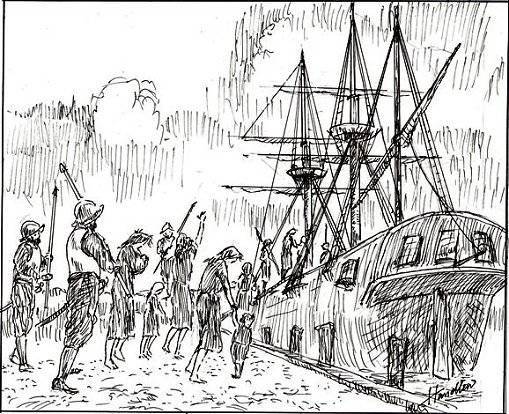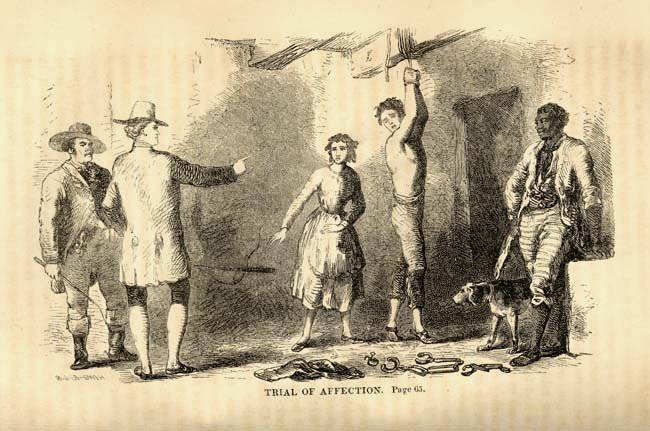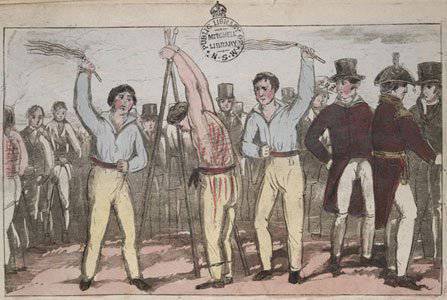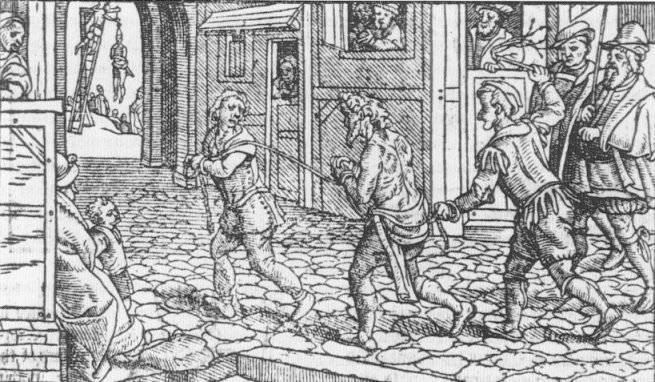White negros in European societies of the New Time, or should the English be considered a nation of slaves

In the near-historical journalism, the opposition of Russian slavery is quite common; freedoms in Europe.
For example, in the pages of the journal “Science and Life”, the historian Alexander Alekseev argues:
The Russian Empire took a firm place among the great European powers. Russian aristocrats were affably met in the best houses of Europe and in European resorts. But at the same time, even the last footman in the Baden hotel knew that these European-looking and often perfectly French-speaking ladies and gentlemen-slave owners.
In the XIX century, in the relations between Russia and the West, the question of slavery (that is, of serfdom) played the same role as the problem of human rights today. The important thing is not even chronology, but the composition of slaves in Europe and the USA. The existence of slavery in Britain before 1772 did not mean at all that English peasants could be traded like cattle: such an idea could not have occurred to the citizens of the United Kingdom; Africans became slaves. And a different approach to the rights of whites and blacks is a completely different problem.
The Russian landowners were not slaves of slaves, but compatriots, brothers in the Christian faith.
However, such a situation does not surprise Alekseeva. In the future, he explains to readers that there is an insurmountable “moral” gulf between the civilization of Europe and Russia:
I will try to formulate the differences that seem to me the most significant. ... The concept of justice as the norm of life is deeply rooted in the minds of ... Western Christians. Justice may be violated, but it does not cease to be the norm. This position was formulated in the XIII century by the German knight jurist Eike von Röpkov: "The century of the domination of unjust custom cannot create rights for a single moment." The average Russian, on the contrary, is deeply convinced that universal theft, lies and lawlessness are normal, and justice exists as a rare exception. Recently, in the TV news, a taxi driver from Abakan, alternating his words with obscenities, expressed the essence of such an understanding of the world: "I believe only in myself and in cash."
In our consciousness, the concept of the right, the same for all, is completely absent. Right, another person is interested in us only if he is sympathetic to us. But if you don't like it or leave it indifferent, let them do anything with it, it does not bother us. Millions of Russians honor Stalin not because they don’t believe in repression, but because they don’t care for the millions of murdered compatriots. Many quite average people, not sadists and not maniacs, justify infanticide — not in war, not from an accidental bomb, but the deliberate killing of children (for example, the little Romanovs or nine-year-old Tajik girls) on the grounds that their parents behaved incorrectly.
... In Western society (mainly Protestant), a lie is considered a grave sin. If in England and the United States a high school student, a college student fell for cheating, this is a stain for life (based on the fact of cheating, for example, the plot of the detective novel by Josephine Tey "Miss Pym puts points"). For us, a lie is something completely harmless, and cheating is generally a nice prank.
And further in the same vein ...
The last passage can be left without comment, but to what extent do the facts of Mr. Alekseev's reasoning about “slavery” correspond to the facts? In Russia (in contrast to the European colonies) there was no plantation slavery, but in fact, before 1862, there were “yard” servants who served as domestic servants and were domestic slaves. This category originated from ancient Russian serfs, that is, from foreigners captured in “captivity” during hostilities, or from people trapped in debt slavery. At the time of the 1862 reform, this stratum (of domestic slaves) was about two percent of the Russian population.
But how true are the claims that the Europeans "turned blacks into slavery only"? Is Alekseev’s statement true that the English peasants "could not trade like cattle" and the Englishmen "could not even think of such a thought" (especially since Alekseev himself was forced to say that the white slaves were still)? What do European historians write about slavery in the colonies?

Different forms of enslavement in the New World replaced each other, displacing one another. Indian slavery could not withstand the incredibly severe ordeal; white European slavery (I am talking about the slavery of French recruits - engages and English servants - servants) will act as an interlude, mainly on the Antilles and in the English colonies on the continent; finally, black African slavery will be strong enough to take root against everything and everyone ... “Recruited” and “servants” were almost slaves. Their fate was not too different from the fate of the blacks starting to arrive; how the latter were transported in the depths of the holds on cramped ships, where there was not enough space and the food was disgusting. When they arrived in America at the expense of some company, the latter was entitled to reimburse the costs: then the recruits sold no more and no less like slaves, the buyers listened and felt them like horses. Of course, the “recruited” or “servants” were neither lifelong nor hereditary slaves, but the owner cared less about keeping them safe: he knew that he would lose them after the rental period expired (36 months in the French Antilles, from 4 to 7 in years English possessions).
Both in England and in France, they used all means in order to recruit the necessary emigrants ... To increase the number of people leaving, false violence was added to the false advertisements. In some quarters of Paris, raids were conducted. In Bristol, they simply abducted men, women, and children ... they condemned the colonies as penal servitude! Under Cromwell, mass shipments of Scottish and Irish prisoners took place. From 1717 to 1779, England sent thousands of exiles to their 50 colonies, and in 1732, the humane evangelist John Oglthrop founded a new Georgia colony wanting to collect numerous prisoners for debt.
Consequently, there was a widespread and long lasting "slavery" of whites ... it disappeared ... for economic reasons and not racial. These reasons had nothing to do with skin color. White slaves gave up their place (to blacks) because they had the disadvantage that they were such only temporarily, and perhaps they were too expensive, if only because of their food.
Fernand Braudel “Material Civilization, Economy and Capitalism” T.3 Chapter “Sequential Types of Servitude”

That is, the Europeans willingly turned their white compatriots into slavery, and if, as a result, the “blacks” were given preference in the plantation economy, then the reasons were not moral, but economic (in particular, the fact that in the tropics white died like flies, being not adapted to equatorial climate and disease).
Well, and the "classic" black slaves - in the colonies of England, France, Holland, in the south of the USA? According to Mr. Alekseev, black slaves were not “theirs” for their white masters and, accordingly, there is nothing particularly bad in such slavery. Indeed, as one Frenchman expressed in the 18 century, “The use of slaves in our colonies teaches us that slavery is not opposed to religion or morality” and Mr. Alekseev seems to share these views. It is quite another thing Russia, where "the slaves were not negros, but compatriots, brothers in the Christian faith" - this is really worthy of condemnation!
But where is the border between "compatriots" and "blacks"? The black slaves (not just brought from Africa, but the bulk) spoke the same language as their masters and professed the same religion (so that they were for their masters the same brothers in the Christian faith as Russian courtyards for Russian landowners). Moreover, they had a common origin with their masters. Among modern African Americans (not immigrants from present-day Africa, but descendants of slaves), there are no “blacks” at all. All of them are mulatto without exception and have white planters among their ancestors. That is, white gentlemen kept in slavery their children, grandchildren, nephews, cousins. Highly indicative story Thomas Jefferson's concubine slave Sally Hemmings. Sally's mother was a mulatto - the daughter of a black slave and a free white, and the father of Sally herself was also a white planter. Sally got Thomas Jefferson as a dowry wife, despite the fact that Sally Hemmings and Jefferson's wife Martha were sisters. The author of the “declaration of independence,” who was under fifty, corrupted a sixteen-year-old slave (a black woman by a quarter) and lived together with her for many years, so she gave birth to eight children from him. Jefferson gave his children (completely white) free, and could (by law) sell them at auction.
The descendants of the third president of the United States and his slave - concubines successfully joined the American "whites". Of course, this is not the only such case, so modern white Americans, British, French have black slaves among their ancestors.
How was it in Europe itself? There also existed slightly camouflaged (or even not camouflaged) slavery

“The detained tramp was flogged with“ chained by the executioner to the back of the cart ”. His head was shaved, he was branded with a hot iron; in the event of a relapse, they threatened to hang him up without trial, or send him to galleys - and they simply sent him ... In 1547, the English parliament ruled that the vagrants would no more go into slavery (this measure was canceled two years later, because solve the problem with the use of these slaves) ... the idea was in the air. Ogier Buzbek (representative of the Spanish king under the Turkish Sultan) believed that "if slavery ... was applied fairly or softer, as Roman law requires, there would be no need to hang and punish all those who have nothing but freedom and life a criminal from want. " And ultimately, this decision will prevail in the 17 century, for is imprisonment and hard labor not slavery? Everywhere, tramps are put under lock and key: in Italy in shelters for the poor, in England in workhouses (workhouse), in Geneva in a correctional prison (Discipline), in Germany in correctional houses (Zuhthauser), in Paris - in strait houses (maison de forse ): in Grand Opital created for the imprisonment of the poor there in 1662, in Bastille, Vincennes Castle, Saint-Lazare, Bicêtre, Sharnton, Madeleine, Saint-Pelagie. Illness and death also came to the aid of the authorities ... And yet neither the tireless worker-death, nor the fierce prisons eradicated evil ... Regardless of the economic boom, pauperism intensified in the 18 century because of the demographic growth ... Thousands of peasants were thrown onto the roads - like that , as long before this time, occurred in England with the beginning of enclosures. In the 18 century, this human mud from which no one could get rid of was swallowed up everything: widows, orphans, cripples, runaway apprentices, priests without church income, old people, fire victims, war victims, red-faced maidservants, mothers' girls, who were chased away and children sent for bread or to theft ... Decent people tried not to think about these "scum of society, the scum of cities, the scourge of the republics, the material for the gallows." There are so many of them everywhere that it would be rather difficult to count them, and they are suitable ... just to send them to the galleys or hang them to serve as an example. ”

To get out of hell, you had to find a job: “The livery of a huge world of servants was always the only open labor market ... and this whole little world had to obey even when the owner was a bastard. A resolution of the Paris Parliament in 1751 sentenced one servant to a pillory and a link for insulting a host. But it was difficult to choose this owner: he chose, and any servant who left his place or was dismissed was considered a vagabond if he did not immediately find another owner: the girls who had no work were seized on the street were subjected to a section, their head was cut off, the men were sent on the galleys. Theft, suspicion of theft meant the gallows. ”
Fernand Braudel "Material Civilization, Economy and Capitalism" by T. 2 of the chapter "Below the zero line" and "Get out of hell"
At the same time, the attitude towards people as an expendable material was not limited to deprived marginals. Here is how the British dealt with the speeches of the Irish peasants:
“The first gun used by the British army was called a triangle. The victims were tied to wooden triangles and mercilessly whipped. On this occasion, 500 whips were prepared. Innocent residents were tortured to find out about their caches. weapons. Diary of a resident tells
“They set fire to several houses near the village - they took Murphy's father to the family. He kept a wine shop in the house where Wills lived. The officers took this innocent man tied to a cart ... and they themselves began to scourge the poor. " Another way of interrogating hit even more. A paper bag of thick, tarred paper was put on the victim's head, then set on fire. The unfortunate victim was trying to pull the package, the resin flowed into the eyes. The package could only strip off with hair and skin. There was also a torture for a man to throw a noose around his neck and weaken it every time a person lost consciousness. ”
»Peter Neville" Ireland Country History ".
This did not happen under Henry VIII, but in 1798.
Information